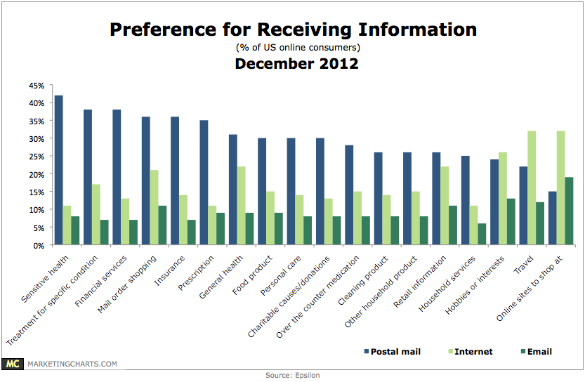Overall, trust in brochures, flyers and direct mail is fairly low, but still beats out email.
16% of US respondents to an Epsilon report gave a top score to traditional print pieces, compared to 12% for email. That landed email at the bottom of the preference list.
When breaking down the responses by gender, women came out as more trusting than men on both counts: 19% compared to 13% for brochures, flyers, and direct mail; 14% compared to 10% for email.
Overall, trust in brochures, flyers and direct mail is fairly low, but still beats out email.
16% of US respondents to an Epsilon report gave a top score to traditional print pieces, compared to 12% for email. That landed email at the bottom of the preference list.
When breaking down the responses by gender, women came out as more trusting than men on both counts: 19% compared to 13% for brochures, flyers, and direct mail; 14% compared to 10% for email.
The biggest finding relates to sensitive health information:
42% want to receive personal health information by postal mail, compared to 11% over the internet and 8% by email. Privacy concerns no doubt play a role.

It is no surprise that the most trusted information sources were doctors and nurses and other healthcare providers. Newspapers, corporate websites and online search engines comprised the next tier of trust, getting the vote from about 1 in 5 respondents.
Key findings from the study include ::
- 42% of U.S. consumers said direct mail is the preferred channel to receive sensitive health information
- 3% of U.S. consumers use mobile QR codes
- U.S. tablet users are 50% more likely to prefer receiving information via email compared to those without smartphones
- 73% said they receive a lot of emails that they simply do not open
- 70% said they have received more emails in the past year than the year before
- 62% said they enjoy checking the mailbox for postal mail
- 51% of U.S. consumers consumers said they pay more attention to postal mail than email
- 73% of U.S. consumers said they prefer direct mail for brand communications because they can read the information at their convenience
About the source :: The Epsilon report on channel preferences for the receipt of marketing information is based on the responses of 1,991 U.S. consumers to an online survey conducted in June 2012. Read the full Epsilon report.






